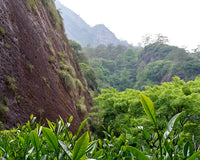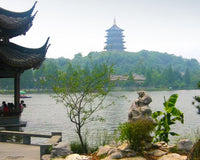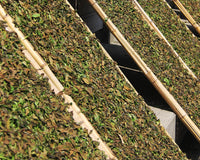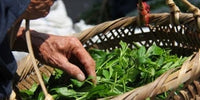a short guide to puerh tea
Puerh tea has recently grown in popularity amongst seasoned tea drinkers in the west but remains enigmatic for those just embarking on their tea journey. We hope this article will explain what Puerh tea is – and hopefully encourage you to try it!
Where does Puerh tea come from?
Unlike most teas, which are classified according to their method of production (green, black, white, and so on), this is the only tea category named after a specific place.
Puerh is the name of a city in Yunnan province in south-west China. Yunnan province lies in the Himalayan Corridor, which also comprises the north of Vietnam and Laos, Myanmar (previously known as Burma) and Assam in north-east India.
These regions in the Himalayan Corridor are where tea is believed to have first grown naturally for hundreds of thousands of years.
Puerh was an important trading post in the tea and horse trade with people high on the Himalayan plateau. Tea was compressed into cakes and wrapped, then transported by horseback along the “Tea Horse Trail” 茶马古道. Tea cakes were, and still are, wrapped in paper and transported in stacks called “Tongs.”

What type of tea is Puerh tea?
Puerh tea is made from the larger-leaf variety of the Camellia plant, Camellia Sinensis Assamica, which originates in the Himalayan Corridor.
Puerh tea is a sub-category of tea known as Hei Cha 黑茶 (dark tea).

How is Puerh tea made?
The base tea (Mao Cha 毛茶) is produced and subsequently undergoes further processing to encourage secondary fermentation or further ripening.
There are two types of Puerh tea; one is left to age and ripen naturally (Sheng Puerh), whereas the other has the ripening process sped up artificially (Shu Puerh).



What is the difference between Sheng and Shu Puerh tea?
Sheng 生 Puerh tea is also called “raw” Puerh.
This is the same type of tea that was carried on the Tea Horse Trail. The young tea cakes are lighter in colour but darken as they age over time. These tea cakes are often bought by families to celebrate the birth of children, much like families in the west might buy a bottle of port and lay it down for years until the child is older.

Shu 熟 Puerh is tea that has been artificially ripened.
After producing the base maocha , it is “wet-piled” and kept covered to allow the microbial organisms in the leaf to ferment or ripen the tea. This process was developed in the 1970s in an attempt to recreate the ageing process that occurs in Sheng Puerh over many years.
If you are interested in finding out more about the production processes involved in both Sheng and Shu Puerh teas, here are two articles that explain it in more detail:

Is Puerh tea the same as black tea?
What we in the West call “black tea” is referred to as Hong Cha 红茶 (red tea) in China. Shu Puerh tea looks similar to our black tea, but the flavour is richer and earthier due to its secondary fermentation.
A young Sheng Puerh looks and tastes lighter than our black tea. As it ages, however, a Sheng Puerh will approach the same appearance and flavour as the Shu Puerh.
What we know as “black tea” is tea that has been fully oxidised (compounds in the leaf have come into contact with oxygen to brown the leaf and create flavour) then baked. At which point no further ripening takes place.
What does Puerh tea taste like?
Sheng Puerh teas develop over time and will become more rounded and complex as they age. Some might have “grassy” characteristics and a hint of earthiness.
Shu Puerh teas are rich, earthy, robust, and warming.Both Sheng and Shu Puerh can be infused numerous times.
Is Puerh tea good for you?
Puerh tea is a fermented tea and as such contains healthy bacteria to aid digestion. It contains polyphenols which are reputed to detoxify the system and combat free radicals. In addition, Puerh tea contains statins that have been shown to lower cholesterol. Compounds in Puerh tea are known to have anti-inflammatory properties too. For these reasons, Puerh tea has recently come to the attention of health-conscious people in the West.
Tea, especially Puerh tea, is fundamental to a healthy lifestyle.
Aids digestion, anti-inflammatory
Detoxifying
Lowers cholesterol
Disclaimer: Please seek advice of medical professionals if you have any health concerns.
Health benefits of Puerh tea have been the subject of some medical studies. You may like to read the following:
NCBI (National Center for Biotechnology Information), published 2016 March 24:
https://www.ncbi.nlm.nih.gov/pmc/articles/PMC4818050/
International Journal of Food Properties, Volume 20, 2017 - Issue 8:
https://www.tandfonline.com/doi/full/10.1080/10942912.2016.1217877
"We source our teas direct"
Sourcing good Puerh tea means travelling to Yunnan to see where the tea plants grow, how the tea is processed, and most importantly taste the finished product.
We have written an article about how we source our teas.















